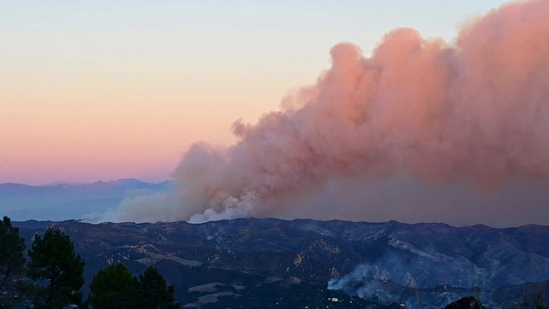Los Angeles Fires Poised to Become Most Costly Disaster in U.S. History
The devastating wildfires currently ravaging Los Angeles are poised to become the most economically destructive natural disaster in U.S. history, with estimated damages reaching a staggering $150 billion. This unprecedented figure represents a significant portion of California’s annual GDP, highlighting the immense and far-reaching impact of these fires on the region’s economy, infrastructure, and its residents.
Private meteorological firm AccuWeather predicts the total economic losses from these fires could range between a staggering $135 billion and $150 billion. While insurance companies are expected to cover an estimated $20 billion in damages, the vast majority of the losses – potentially exceeding $100 billion – are likely to be uninsured. This stark reality underscores a growing insurance crisis, as many homeowners find themselves inadequately protected against the escalating risks of catastrophic events like these.
Diane Delaney, executive director of the Private Risk Management Association, aptly summarized the situation, stating, “This will probably be the largest number of people uninsured or underinsured during a massive catastrophic event like this.”
The High Cost of Destruction: Property Values and Unprecedented Losses
A key factor contributing to the immense economic impact of these fires is the exorbitant value of the properties destroyed. Over 10,000 structures have been consumed by the flames, with the average home value in affected areas exceeding $3 million. This starkly contrasts with the 2018 Camp fire, which, while devastating, involved the destruction of 18,000 structures with an average home value of only $500,000.
The Pacific Palisades neighborhood, for example, boasts an estimated market value of $13.5 billion, showcasing the immense wealth concentrated within the affected areas. This concentration of wealth significantly amplifies the financial impact of these fires.
Navigating the Insurance Crisis: Challenges and Solutions
While insurance companies possess significant financial reserves to cover a portion of these losses, the sheer scale of this disaster presents a formidable challenge. To mitigate risk, insurers have increasingly reduced their exposure in high-risk wildfire zones, limiting the availability of affordable coverage for homeowners.
California Insurance Commissioner Ricardo Lara has taken steps to address this issue by implementing measures to protect homeowners. A key initiative mandates that insurance companies in fire-affected areas are prohibited from canceling or refusing to renew policies for one year. This measure provides crucial protection for homeowners during this period of crisis.
The Role of the FAIR Program and Insurance Reforms
California’s FAIR (Fair Access to Insurance Requirements) program, a public insurance initiative designed for homeowners unable to secure coverage in the private market, has played a crucial role in mitigating the impact of these fires. However, the program’s exposure has dramatically increased, rising from $50 billion in 2018 to over $450 billion today, highlighting the growing need for alternative solutions.
To incentivize insurers to return to the market, Commissioner Lara has implemented reforms that allow companies to adjust premiums while simultaneously prohibiting geographical exclusions. This balanced approach aims to ensure the financial stability of insurers while maintaining access to coverage for homeowners in high-risk areas.
The devastating impact of the Los Angeles fires serves as a stark reminder of the escalating costs of climate change. As climate change intensifies, the frequency and severity of extreme weather events, including wildfires, hurricanes, and winter storms, are expected to increase. This will have significant economic and social consequences, impacting not only California but the entire nation.
Susan Crawford, a climate and geopolitics specialist, emphasized the urgent need for systemic adjustments to address the growing threat of climate change. “The acceleration in ferocious weather events… should trigger awareness that actually things do need to change,” Crawford stated.
The Los Angeles fires serve as a stark reminder of the urgent need for a comprehensive and coordinated response to the challenges posed by climate change. From reforming insurance systems and strengthening disaster preparedness to investing in climate adaptation strategies, significant changes are necessary to mitigate the risks and build a more resilient future.
This crisis demands a collaborative effort between government agencies, the insurance industry, and the broader community to address the complex challenges posed by climate change and ensure the safety and well-being of all citizens.


Comments are closed.